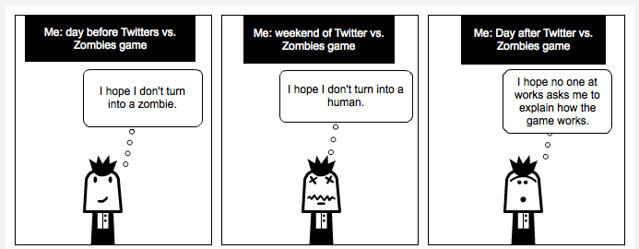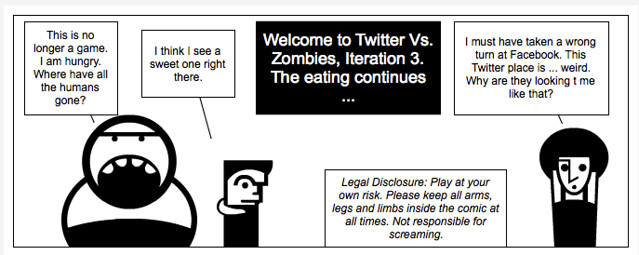
This weekend, the third iteration of the Twitter-based hashtag game called Twitter vs. Zombies took place, and I joined in when I could. I was part of the first iteration last year, never knew about the second earlier this year, and only heard about the third iteration from a friend in DS106 … on Twitter, of course.
The game is a bit difficult to explain, as the rules shift as the game progresses but essentially it is a large, virtual game of tag. Some of the main ideas are:
- Twitter becomes the “game board” where the action takes place;
- Hashtags — such as #bite and #dodge — are the actions that players take in the game;
- The goal of the game: Zombies try to turn all humans in zombies, and humans try to avoid getting turned into zombies;
- Players begin as humans and then become zombies, and then maybe back to humans;
- The game unfolds over three days of activity;
- Collectives of humans seek to outrun zombies, who also work in teams to get the humans;
- The moderators add new rules and twists to the game once or twice a day;
- Sense of humor required.
But even that list of my own understanding of the Twitter vs. Zombies game doesn’t do it justice. When we think about how to leverage the possibilities of the Web and its various spaces for collaborative and interactive experiences, this kind of game is what we are talking about. Think about an interactive experience that unfolds over a number of days, in which people who don’t know each other must collaborate, and be creative, to accomplish a goal … that’s really what Twitter vs. Zombies is all about, for me.
Plus, I had a blast playing it. And I created comics, Vine videos, word clouds, music mixes and more as a way to add my own media touch into the game atmosphere.
Last time I played, I think I wrote about wondering how this sort of uncentered game experience might translate into the classroom. Not as Twitter vs. Zombies, perhaps, but some variation of it in which our students are engaged in a global gaming structure that requires deftness, creativity and collaboration. I’m still wondering about that.
I want to thank the moderators of the weekend’s game. Even though I got bitten and turned into a Zombie early in the game (I was teaching on Friday when the game began) and never got an antidote from anyone to turn back to human (and by Sunday, I was ready — I just couldn’t announce it … or could I have?), I had a blast, popping in and out of the action as our busy family life allowed. Engaging in Twitter vs. Zombies reminded me again of the many ways that technology and the connected world can transform how we think about learning and playing.
Peace (coming out of the darkness),
Kevin
